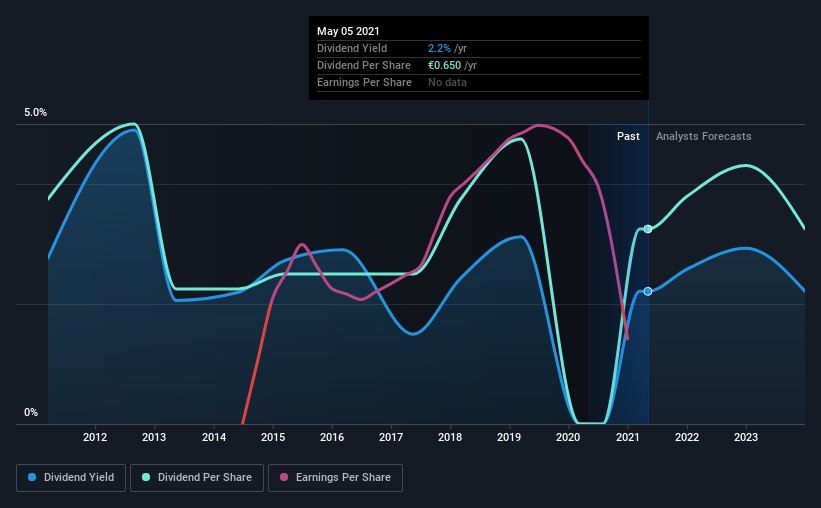
Could Mersen SA (EPA:MRN) be an attractive dividend share to own for the long haul? Investors are often drawn to strong companies with the idea of reinvesting the dividends. If you are hoping to live on your dividends, it's important to be more stringent with your investments than the average punter. Regular readers know we like to apply the same approach to each dividend stock, and we hope you'll find our analysis useful.
While Mersen's 2.2% dividend yield is not the highest, we think its lengthy payment history is quite interesting. The company also bought back stock during the year, equivalent to approximately 0.6% of the company's market capitalisation at the time. Some simple analysis can reduce the risk of holding Mersen for its dividend, and we'll focus on the most important aspects below.
Explore this interactive chart for our latest analysis on Mersen!

Payout ratios
Dividends are typically paid from company earnings. If a company pays more in dividends than it earned, then the dividend might become unsustainable - hardly an ideal situation. As a result, we should always investigate whether a company can afford its dividend, measured as a percentage of a company's net income after tax. Although it reported a loss over the past 12 months, Mersen currently pays a dividend. When a company recently reported a loss, we should investigate if its cash flows covered the dividend.
Consider getting our latest analysis on Mersen's financial position here.
Dividend Volatility
Before buying a stock for its income, we want to see if the dividends have been stable in the past, and if the company has a track record of maintaining its dividend. Mersen has been paying dividends for a long time, but for the purpose of this analysis, we only examine the past 10 years of payments. The dividend has been cut on at least one occasion historically. During the past 10-year period, the first annual payment was €0.8 in 2011, compared to €0.7 last year. The dividend has shrunk at around 1.4% a year during that period. Mersen's dividend hasn't shrunk linearly at 1.4% per annum, but the CAGR is a useful estimate of the historical rate of change.
When a company's per-share dividend falls we question if this reflects poorly on either external business conditions, or the company's capital allocation decisions. Either way, we find it hard to get excited about a company with a declining dividend.
Dividend Growth Potential
With a relatively unstable dividend, it's even more important to evaluate if earnings per share (EPS) are growing - it's not worth taking the risk on a dividend getting cut, unless you might be rewarded with larger dividends in future. It's good to see Mersen has been growing its earnings per share at 29% a year over the past five years.
Conclusion
To summarise, shareholders should always check that Mersen's dividends are affordable, that its dividend payments are relatively stable, and that it has decent prospects for growing its earnings and dividend. First, it's not great to see a dividend being paid despite the company being unprofitable over the last year. Next, earnings growth has been good, but unfortunately the dividend has been cut at least once in the past. In summary, we're unenthused by Mersen as a dividend stock. It's not that we think it is a bad company; it simply falls short of our criteria in some key areas.
Companies possessing a stable dividend policy will likely enjoy greater investor interest than those suffering from a more inconsistent approach. Meanwhile, despite the importance of dividend payments, they are not the only factors our readers should know when assessing a company. For example, we've identified 2 warning signs for Mersen (1 makes us a bit uncomfortable!) that you should be aware of before investing.
If you are a dividend investor, you might also want to look at our curated list of dividend stocks yielding above 3%.
If you decide to trade Mersen, use the lowest-cost* platform that is rated #1 Overall by Barron’s, Interactive Brokers. Trade stocks, options, futures, forex, bonds and funds on 135 markets, all from a single integrated account. Promoted
New: Manage All Your Stock Portfolios in One Place
We've created the ultimate portfolio companion for stock investors, and it's free.
• Connect an unlimited number of Portfolios and see your total in one currency
• Be alerted to new Warning Signs or Risks via email or mobile
• Track the Fair Value of your stocks
This article by Simply Wall St is general in nature. It does not constitute a recommendation to buy or sell any stock, and does not take account of your objectives, or your financial situation. We aim to bring you long-term focused analysis driven by fundamental data. Note that our analysis may not factor in the latest price-sensitive company announcements or qualitative material. Simply Wall St has no position in any stocks mentioned.
*Interactive Brokers Rated Lowest Cost Broker by StockBrokers.com Annual Online Review 2020
Have feedback on this article? Concerned about the content? Get in touch with us directly. Alternatively, email editorial-team (at) simplywallst.com.
About ENXTPA:MRN
Mersen
Manufactures and sells electrical power products and advanced materials in France, North America, rest of Europe, the Asia-Pacific, and internationally.
Undervalued with adequate balance sheet.
Similar Companies
Market Insights
Community Narratives



